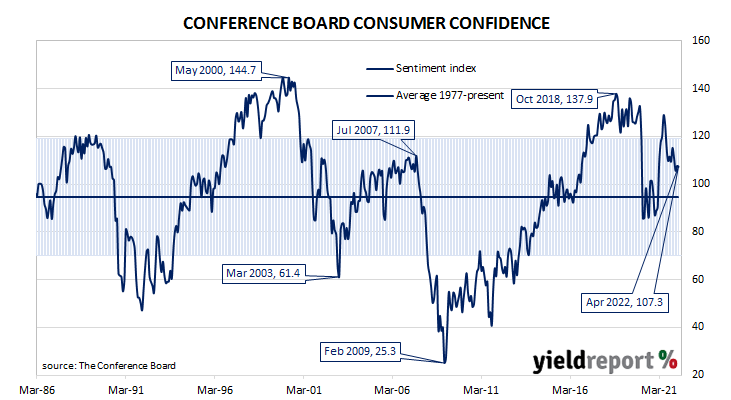Summary: Conference Board Consumer Confidence Index deteriorates in April; lower than consensus expectations; view of present conditions deteriorate, short-term outlook improves; Present Situation Index “remains quite high”, implies US economy will continue expansion in June quarter; “recent slump in confidence may be abating”.
After the GFC in 2008/09, US consumer confidence clawed its way back to neutral over a number of years and then went from strength to strength until late 2018. Measures of consumer confidence then oscillated within a fairly narrow band at historically high levels until they plunged in early 2020. Subsequent readings then fluctuated around the long-term average until March 2021 when they reached elevated levels.
The latest Conference Board survey held during the first three weeks of April indicated US consumer confidence has again deteriorated slightly. April’s Consumer Confidence Index registered 107.3 on a preliminary basis, lower than the median consensus figure of 108.4 and slightly below March’s final figure of 107.6.
In contrast with March’s report, consumers’ views of present conditions deteriorated slightly while their outlook for the near-future improved. The Present Situation Index slipped from March’ revised figure of 153.8 to 152.6 while the Expectations Index increased from a revised figure of 76.7 to 77.2.
“The Present Situation Index declined but remains quite high, suggesting the economy continued to expand in early Q2. Expectations, while still weak, did not deteriorate further amid high prices, especially at the gas pump, and the war in Ukraine,” said Lynn Franco, a senior director at The Conference Board.
US Treasury yields moved loved on the day, especially at the short end of the yield curve. By the close of business, the 2-year Treasury bond yield had shed 13bps to 2.50%, the 10-year yield had lost 9bps to 2.73% while the 30-year yield finished 6bps lower at 2.83%.
In terms of US Fed policy, expectations for a higher federal funds rate over the next 12 months softened. At the close of business, May contracts implied an effective federal funds rate of 0.775%, 44bps higher than the current spot rate. July contracts implied 1.45% while March 2023 futures contracts implied an effective federal funds rate of 2.895%, 256bps above the spot rate.
ANZ senior economist Felicity Emmett noted the index reading was below expectations but still suggested “the recent slump in confidence may be abating.” However, she also pointed to inflation as “undoubtedly a factor at play in the recent weakness in confidence.”
The Consumer Confidence Survey is one of two monthly US consumer sentiment surveys which result in the construction of an index. The Conference Board’s index is based on perceptions of current business and employment conditions, as well as respondents’ expectations of conditions six months in the future. The other survey, conducted by the University of Michigan, is similar and it is used to produce an Index of Consumer Sentiment. That survey differs in that it also includes some longer-term questions.


